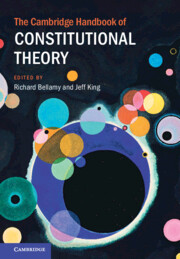Book contents
- The Cambridge Handbook of Constitutional Theory
- The Cambridge Handbook of Constitutional Theory
- Copyright page
- Contents
- Figures
- Contributors
- Frontispiece
- Preface and Acknowledgements
- 1 Introduction
- Part I Values
- 2 Human Dignity
- 3 Rights
- 4 Equality
- 5 Liberty
- 6 Well-Being
- 7 Self-Government
- 8 Justice
- 9 Recognition
- Part II Modalities
- Part III Institutions
- Part IV Challenges for Constitutional Democracy
- Bibliography
- Index
- References
8 - Justice
Procedural and Substantive
from Part I - Values
Published online by Cambridge University Press: 27 March 2025
- The Cambridge Handbook of Constitutional Theory
- The Cambridge Handbook of Constitutional Theory
- Copyright page
- Contents
- Figures
- Contributors
- Frontispiece
- Preface and Acknowledgements
- 1 Introduction
- Part I Values
- 2 Human Dignity
- 3 Rights
- 4 Equality
- 5 Liberty
- 6 Well-Being
- 7 Self-Government
- 8 Justice
- 9 Recognition
- Part II Modalities
- Part III Institutions
- Part IV Challenges for Constitutional Democracy
- Bibliography
- Index
- References
Summary
This paper argues for the normative priority of justice as compared to other values. A conception of justice must provide reasons concerning the kind of, for example, liberty or equality that members of a normative order can justifiably claim and demand of each other. Based on a distinction between two ways of thinking about justice, relational-structural accounts of justice versus outcome- and recipient-oriented approaches (such as luck egalitarianism), a conception of justice as justification is developed and located in the first paradigm. That conception considers the question of the power individuals and groups have to co-determine the basic structure of their society as the first question of justice. Developing the substantive and procedural aspects of this view, a particular view of the role and nature of a constitution is suggested. Its task is to establish a basic structure of justification that secures the status of non-dominated legal, political and social equals who ought to be the authorities within that order. In various ways, from enshrining basic rights to democratic procedures and social protections, a constitution raises thresholds of justification in contexts where subjection to forms of unjustified, arbitrary rule is a threat.
Keywords
- Type
- Chapter
- Information
- The Cambridge Handbook of Constitutional Theory , pp. 121 - 135Publisher: Cambridge University PressPrint publication year: 2025

